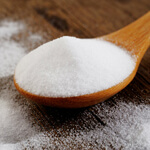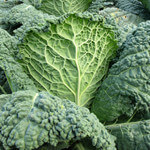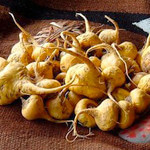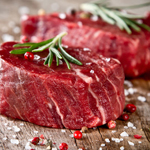Table of Contents
 It’s difficult to find a food product more versatile than baking soda. This white soluble compound, which is also called sodium bicarbonate, has been used for centuries – even as far back as ancient Egypt – as a natural cleaning agent and preservative. In 1843, when the British chemist Alfred Bird created commercial baking soda, the compound gained further popularity as a quick-acting leavener of baked goods.
It’s difficult to find a food product more versatile than baking soda. This white soluble compound, which is also called sodium bicarbonate, has been used for centuries – even as far back as ancient Egypt – as a natural cleaning agent and preservative. In 1843, when the British chemist Alfred Bird created commercial baking soda, the compound gained further popularity as a quick-acting leavener of baked goods.
Today, baking soda can be found in almost every home, and it still remains popular as a baking ingredient. Due to its pH-regulating abilities, however, this inexpensive and environmentally-friendly product has far more uses than most people realize – and many of those uses extend well beyond the kitchen.
Deodorant
Baking soda is a strong antibacterial and can kill the bacteria responsible for making sweat smell. Simply mix an eighth of a teaspoon of baking soda with a small amount of purified water (avoid dissolving them) and rub the solution under your arms. This is a much more natural way of neutralizing odors than using commercial deodorants, whose ingredients list often reads like a chemistry set.
Please note that baking soda is not an anti-antiperspirant. Natural anti-antiperspirants don’t exist, since only chemicals are able to stop our body’s sweat glands from functioning (which is a bad idea, and can lead to long-term toxicity). Therefore, you’ll still sweat when using natural deodorants like baking soda, but the sweat will have a neutral odor.
Toothpaste
There’s a good reason why many natural toothpastes contain baking soda: its antibacterial properties help prevent plaque build-ups (and whiten the teeth as a bonus). It’s not necessary to purchase an overpriced natural toothpaste, however, when baking soda alone does the job just as well. Simply take a pinch of baking soda and place it in a small bowl. Then, add some purified water to the bowl and mix until the solution is slightly runny. Some people like to add sea salt to the solution to boost its effectiveness.
The FDA has desperately tried to scare people away from using baking soda as a toothpaste by claiming that it’s “too abrasive.” Like other time-honored tooth cleaners such as hydrogen peroxide, though, this alleged abrasiveness can be controlled through dilution. If your teeth are sensitive, for example, consider adding more water to the solution. This will decrease the potency of the baking soda, resulting in a gentler (but still effective) cleanse.
Antacid
If you’re suffering from heartburn, indigestion, or any other condition caused by excess stomach acid, dissolve a teaspoon of baking soda into a cup of purified water and drink the solution slowly (preferably on an empty stomach). Baking soda is highly alkaline and will help neutralize stomach acid in no time. In fact, chronic sufferers of excess stomach acid often admit that the relief provided by baking soda is longer-lasting than that provided by commercial antacid tablets.
Facial Cleanser
Baking soda makes a great facial cleanser, and is known to improve acne, eczema, blackheads, and other skin conditions. To create a facial wash, mix two teaspoons of baking soda and one teaspoon of warm water in a small bowl, then stir the mixture until a soft paste forms. After cleaning your face with warm water (this will help remove excess grime), cover it with the paste using your fingers. Gentle, circular motions seem to work best. Finally, after a couple of minutes have passed, remove the paste and wash your face thoroughly with warm water until all residue is removed.
Laundry Detergent
Adding baking soda to your laundry is an effective, cost-efficient and chemical-free way to keep your clothes clean and soft. Simply add half a cup of baking soda to each laundry load (if you’re cleaning the laundry manually in a tub with water) or to each rinse cycle (if you’re using a washing machine). Baking soda is a particularly good choice for people who favor clothes made from natural fibers such as organic cotton, linen, or hemp. After all, what’s the point in purchasing these natural clothes if they’re just going to be ruined with chemical detergents?






